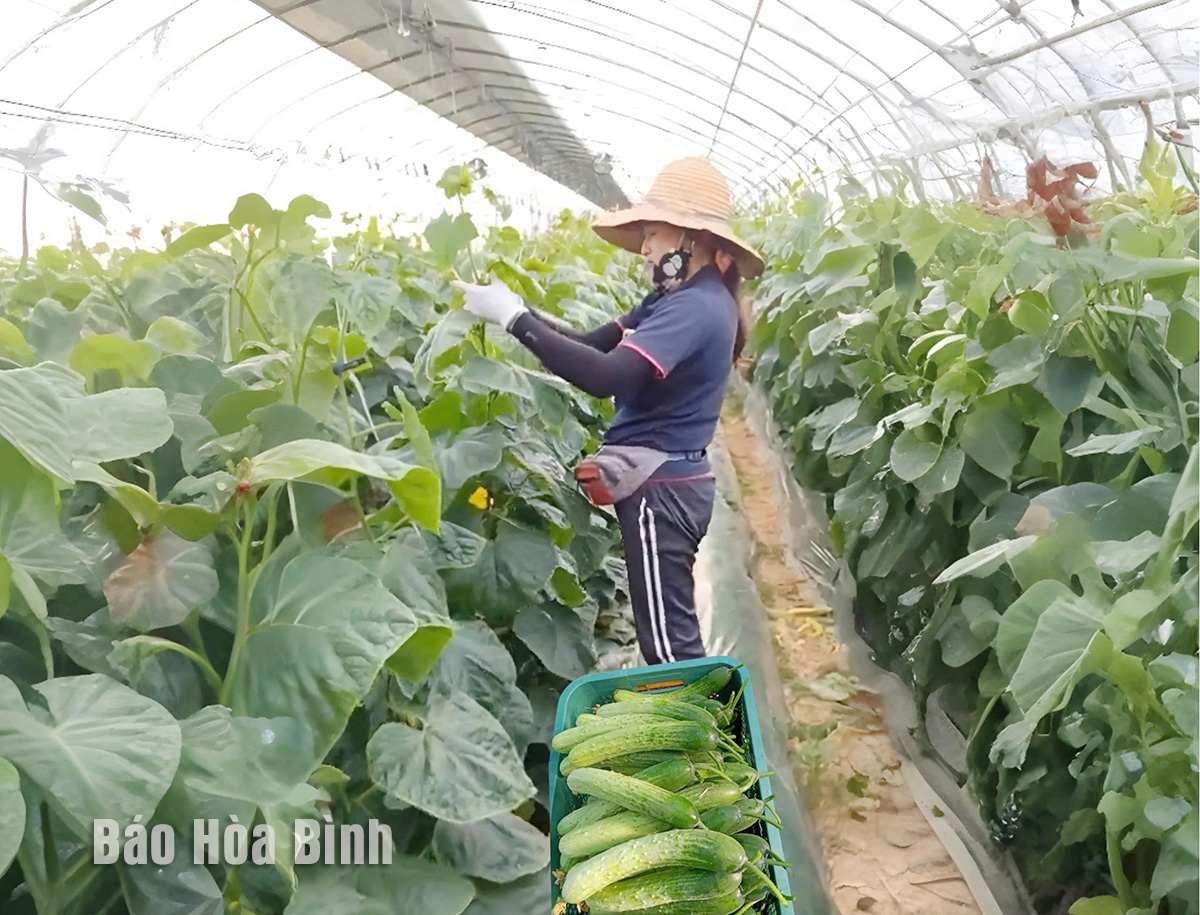
In late March, 29 labourers from Da Bac district were sent to work as seasonal farm workers in Buyeo county, Chungcheongnam province, the Republic of Korea (RoK). Upon arrival, they quickly settled into their jobs, enjoying good working conditions and benefits, with wages aligned with the terms of their signed contracts. The programme is now being expanded, with relevant departments and sectors actively seeking additional seasonal employment opportunities in various localities across the RoK.
A labourer from Da Bac district works at a farm in Buyeo county, Chungcheongnam province, the Republic of Korea.
Giving priority to the impoverished district of Da Bac, the province launched the second round of its seasonal overseas employment programme, while also carrying out preliminary health checks, as well as assessments of skills and work experience.
Luong Thi Mo, a 42-year-old resident of Kia Hamlet, Yen Hoa Commune, shared that, with only basic skills and given their current circumstances, many working-age people, especially those in middle age are eager for opportunities to change their lives and support their families. For her, seasonal overseas employment has opened up that opportunity. "I heard that the Korean side is seeking 50 workers in this second round. As one of 200 applicants, I hope to be selected,” she said.
The pilot programme to send seasonal workers to the RoK under locality-to-locality cooperation is a meaningful initiative, aimed at implementing Government Resolution No. 59/NQ-CP dated April 27, 2022. The resolution supports ongoing efforts to dispatch seasonal labourers through partnerships between Vietnamese and Korean localities. After extensive preparation, on November 4, 2024, Hoa Binh province signed a cooperation agreement to send farm workers to Buyeo county, Chungcheongnam province. The programme is non-profit and conducted by state agencies and public institutions, making it accessible and suitable for local workers.
According to Do Hong Truong, Director of the Hoa Binh provincial Employment Service Centre, the initial phase of the programme has delivered promising results. Workers have shared photos and videos showing well-organised, clean accommodations with full amenities, and a rural working environment similar to that in Vietnam. Their main tasks include cultivating and harvesting cucumbers, tomatoes, vegetables, and various fruits. All 29 workers reported satisfaction, adherence to contract terms, and a positive attitude toward their work.
Eligibility criteria for the seasonal overseas employment programme include permanent residency in Hoa Binh province, being aged between 25 and under 50, and having at least one year of experience in agricultural work. Contract durations range from five to eight months, with monthly wages equivalent to VND36–37 million (around 1,390 – 1,430 USD).
In April, the Department of Home Affairs submitted a proposal to the provincial People’s Committee, seeking the approval for signing cooperation agreements with RoK localities. To proactively identify potential candidates, district- and city-level authorities have disseminated information about the programme to communes, wards, towns, and local organisations such as youth, women and farmers’ unions. To date, more than 500 people across the province have expressed interest in participating.
Bui Manh Cuong, Deputy Director of the Department of Home Affairs, said as the global labour market continues to expand, seasonal labour dispatch to the RoK is attracting strong interest.
With its competitive wages, professional work environment, and valuable learning opportunities, the programme not only opens new venues for sustainable poverty reduction but also helps rural workers gain scientific and technological knowledge. This can later be applied to develop local production models upon their return, he said.
More than just an information technology teacher, Bui Van Nien is an inspiring figure who has nurtured the scientific curiosity and creative spirit of students in Vietnam’s ethnic minority communities.
Da Bac is the most disadvantaged mountainous district in Hoa Binh province, with ethnic minorities accounting for about 90% of its population. Over the past years, the district has mobilised resources to implement ethnic policies to improve the quality of life of local people.
In recent years, Hoa Binh province has consistently prioritised the protection, care, and education of children, particularly those from ethnic minorities and disadvantaged backgrounds, by creating a safe, healthy, and nurturing environment for their all-round development.
The Steering Committee for Tobacco Harm Prevention and Control of Hoa Binh province, in coordination with the Tobacco Harm Prevention and Control Fund, held a ceremony on May 28 in response to the World No Tobacco Day (May 31) and the National No Tobacco Week (from May 25 to 31). The event was chaired by Nguyen Van Toan, Standing Vice Chairman of the provincial People’s Committee and head of the Steering Committee.
Since 2021, the Center for Industrial Promotion and Industrial Development Consulting (CIIDC) under the Department of Industry and Trade has been implementing a school lighting model as part of the plan for using energy efficiently and economically in Hoa Binh Province in the pẻiod of 2021 - 2025. This model not only aims to improve the learning conditions and enhance the education quality, but it also promotes the message of energy saving, energy security, environmental protection and contributes to the goals of socio-economic development.
In the 2024 - 2025 school year, the entire Hoa Binh provincial education sector includes 520 educational institutions and schools. Among them are 13 ethnic boarding schools with 153 classes and 4,487 students. Four of these schools have met national standards, reaching 30.7 percent.



